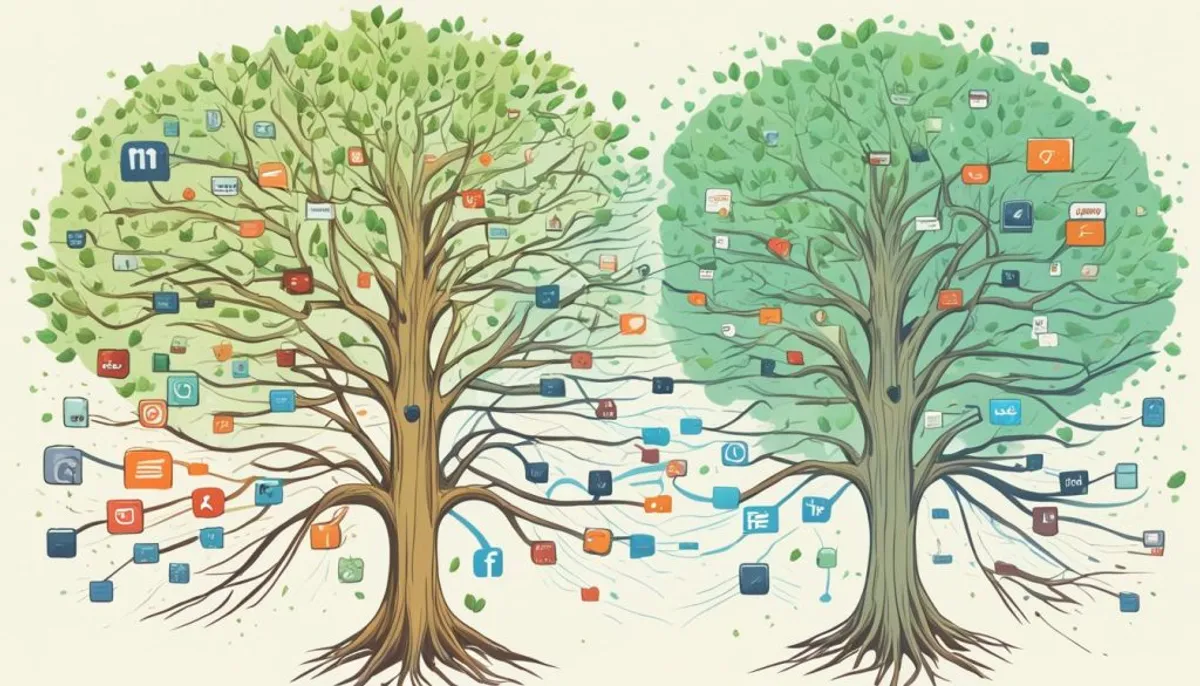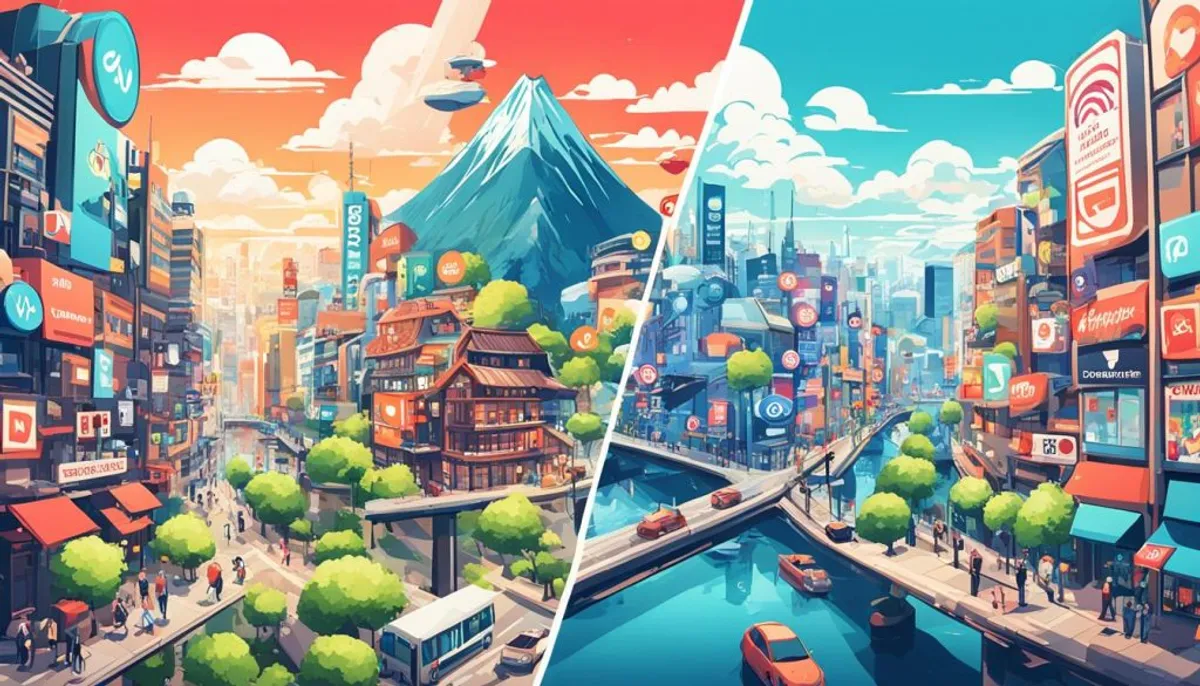The difference between social media and websites matters a lot. It’s key for those looking to be online. Both are ways to market online but have different uses and benefits. Social media like Facebook, Instagram, and Twitter let people connect, share, and talk. Websites give a place just for one business or person. Here, they can show who they are, sell things, and share lots of details.
Key Takeaways
- Social media platforms and websites serve different purposes in an online presence strategy.
- Websites offer greater customization and branding opportunities compared to social media.
- Social media platforms are subject to algorithm changes that can impact content visibility and reach.
- Websites provide more flexibility in website traffic sources and website conversion optimization.
- Websites offer enhanced website monetization models compared to social media platforms.
Defining Social Media and Websites
The digital world has social media and websites. Knowing the difference helps people and companies. They can make a strong online presence and content distribution strategies by leveraging digital networking solutions.
What is Social Media?
Social media are apps for sharing and creating user-generated content. They let people and companies talk, share, and meet others online. You can find it on Facebook, Instagram, and others. One notable example is the interpro social network, which is good for sharing, talking to others, and building groups.
What is a Website?
Websites are online pages you can visit. They are all about info, buying stuff, or fun. Unlike social media, one person or group owns each website. This means they have full control over how they look and what they say. Websites are great for showing off brands and goals, including promoting digital products for creators. They are key for making money online.

Key Distinctions Between Social Media and Websites
Social media and websites are different when it comes to owning and controlling spaces. You use social media on platforms that can change or close your account. Websites are yours to own, giving you control over what’s on them.
Content Lifespan
Content on social media doesn’t last long because it can quickly be forgotten. But on a website, your content can stay and bring people to your site for years.
Customization and Branding
With a website, you can make it look just the way you want to match your brand. Social media doesn’t give you as many options to show off your unique style.
Audience Reach
If you have a website, anyone can find and visit it. Social media algorithms, though, can limit who sees your posts, even if many follow you.
Selling and Monetization Capabilities
You can sell things and make money on your website in more ways than you can on social media, including selling merchandise on social media. This means more options for making a profit without sharing earnings.
Data Analytics
Website owners can learn a lot about their visitors for free with tools like Google Analytics. But, social media might charge for deeper insights and control what data you can see.
Long-Term Availability
Websites stay around as long as you keep them up. But social media can change or even go away, not giving you as much stability.

| Attribute | Social Media | Website |
|---|---|---|
| Ownership and Control | Rented or borrowed space, subject to platform rules and changes | Digital property of the individual or organization, complete control over content, design, and functionality |
| Content Lifespan | Shorter, as content can get buried in feeds | Longer, with potential for sustained engagement through SEO |
| Customization and Branding | Limited, predetermined by platform design | Greater, able to fully reflect brand’s aesthetic, voice, and values |
| Audience Reach | Limited by platform algorithms, require paid advertising for visibility | Potential for organic traffic through SEO, not limited by platform algorithms |
| Selling and Monetization | Limited to platform-specific tools, sponsored posts, or affiliate marketing, often with revenue sharing | More flexibility in monetization options, such as selling products/services, hosting ads, or setting up membership areas |
| Data Analytics | Platform-controlled, may require payment for in-depth insights | Detailed visitor data and behavior analysis through tools like Google Analytics |
| Long-Term Availability | Platforms come and go, users have no control over longevity or changes | Constant digital property that can adapt and evolve with the brand or individual |
Conclusion
Social media and websites are both key in digital marketing. It is important to know how they differ. Social media is great for talking with customers and showing your brand right away. A website gives you more control and is better for the long term.
It’s best to use both together. Use social media to bring people to your site and keep them interested. Then, your site can show who you really are and what you can offer. By knowing what each one is good at, you can make a stronger plan. This plan helps your business on the internet and meets your goals.
Your choice between social media and a website should fit what you want to do. Using both right can help you a lot. It can help you reach your goals, let more people know about your brand, and turn readers into customers. Understanding social media algorithms can also enhance your strategy for engaging with your audience.
FAQ
What is the difference between social media and websites?
Social media lets you connect with others. It’s places like Facebook, Instagram, and Twitter. They are good for sharing things.
Websites are your own spot online. Businesses and people use them to show who they are and what they do. They can sell things and give lots of details.
What are the key characteristics of social media platforms?
Social media helps you make and share things. You can talk with others and find community, including wichita online communities. It is where you can be social online.
What is the primary distinction between social media and websites in terms of ownership and control?
Social media is like a borrowed place. You follow their rules and use their space. Websites are your own digital land. You control everything there.
How does the lifespan of content differ between social media and websites?
Content on social media can get lost fast. But on a website, it can stay for years. Websites use things like SEO to keep bringing in visitors.
What are the advantages of website customization and branding compared to social media platforms?
Websites let you show your brand in every way. You can make it look and feel just like you. Social media only offers basic ways to show who you are.
How do social media algorithms and website traffic differ in terms of audience reach?
Social media decides who sees your posts. Even if you have lots of fans, not all will see what you share. This is influenced by social media algorithms. Websites are open to everyone. With good SEO, you can get visitors without any limits.
What are the differences in selling and monetization capabilities between social media and websites?
On social media, you can sell using their tools. But, they often get a cut of your sales. With your website, you can sell more freely. You can also put ads, have memberships, or offer online classes without sharing your earnings.
How do the data analytics capabilities differ between social media and websites?
Social media gives you some data, but they keep it mostly. For more insights, you might have to pay. Websites, with tools like Google Analytics, offer you all kinds of visitor information. This helps make your website better and your marketing smarter.
What is the difference in long-term availability between social media and websites?
Social media sites can change or disappear. But you can always have your own website. It stays with you, letting you grow and change online.
RelatedRelated articles



